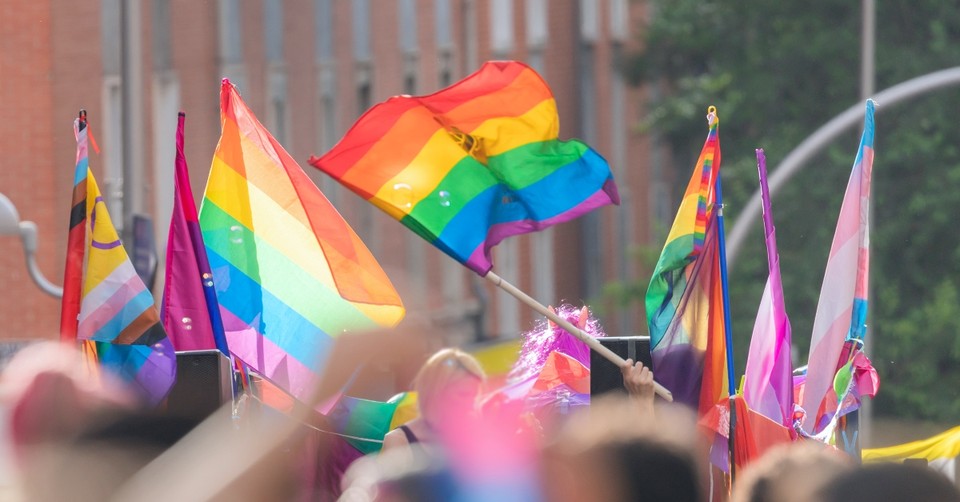3 Biblical Ways for Christians to Approach Pride Month

Every year, LGBTQ+ Pride Month seems to become a larger cultural celebration, from multiple parades and other events to corporate marketing campaigns and — depending on who’s in office — official governmental observance.
And every year, many in the Christian community grow increasingly critical, embittered, and militant in their responses to this cultural shift. What’s more is that the controversy seems to begin earlier every year, with debate swirling as early as mid-May.
How Should Christians Respond to Pride Month?
For thoughtful Christians, though they affirm the traditional view that sex is reserved for a lifelong marriage relationship between one man and one woman, they may wonder if waging a relentless culture war is the godliest or most fruitful way to approach this set of issues.
If you are a follower of Jesus who affirms a traditional view of sex and gender and is increasingly concerned about the celebration of a sexual ethic that is not only contradictory to your convictions but oftentimes corrosive to the health of our society but is equally skeptical that launching into a month-long homophobic diatribe every summer is the best path forward, I’m with you.
If you are striving to engage with the LGBTQ+ community with equal parts grace and truth, here are at least three things to keep in mind.
1. Separate What Really Matters from What Doesn’t
Earlier this month, President Joe Biden presided over the largest LGTBQ+ Pride celebration ever to be hosted at the White House.
More than a thousand people were in attendance, including individuals from the LGTBQ+ community who have served in high-ranking roles in government, as well as survivors of mass shootings that specifically targeted the LGBTQ+ community.
As Biden stood in front of a Pride flag flying between two American flags on the Truman Balcony of the White House, he addressed attendees gathered on the South Lawn, reiterating his commitment to LGBTQ+ rights and inclusion.
Unsurprisingly, the president was sharply criticized by many who were quick to point out that the White House had violated flag etiquette by placing a Pride flag in the place of prominence over and against the American flag — all for the sake of virtue signaling.
Later, footage of a trans activist who identifies as a woman standing topless in front of the White House drew further criticism.
While the Biden administration later indicated that the activist would not ever be invited to the White House again, many conservative pundits and online personalities took the opportunity to depict the entire LGBTQ+ community — and Biden along with it — as a fundamentally depraved and perverted group of people.
Nevertheless, while these images were certainly shocking and thus received much attention, the fact of the matter is that these matters of virtue signaling will be forgotten by the end of the news cycle.
In fact, the only aspect of the event that seemed to indicate a push toward anything with reaching implications was the one thing that was conspicuously absent from outraged conservative coverage — what Biden actually said in his address.
In his remarks, President Biden urged Congress to pass the Equality Act, which is an amendment to the Civil Rights Act of 1964 that would add protections against discrimination on the basis of sex, sexual orientation, and gender identity.
While, to many, this sounds like a neutral, if not good, thing for the cause of liberty and freedom, the bill is actually deeply concerning for those who hold to a traditional sexual ethic. If passed as written, it would pose a significant risk to American religious liberty.
Now, religious liberty in America is strong. With every recent Supreme Court battle that has examined the cross-section between religious liberty and anti-discrimination laws, protections for freedom of conscience for Christians have been upheld and strengthened.
Nevertheless, the Equality Act represents a legitimate threat to the longstanding tradition of religious liberty in America.
When you understand this, it seems somewhat frivolous to fixate on the indecent actions of one trans activist — which don’t personally impact us and have been denounced by conservatives and progressives alike — while ignoring the very real threat of legislation that could hamper our ability to worship freely in America.
I understand that debating the nuances of public policy doesn’t exactly make for eye-popping content. But it is where change actually occurs, where rights are won or lost. It is an area of concern that actually means something.
What’s more, you can offer very reasoned critiques of legislation like the Equality Act and its troubling implications for religious freedom without devolving into bigoted or homophobic rhetoric.
2. Remember That Standing on Truth and Being Hateful Are Not the Same Thing
In line with the above commitment, thoughtful Christians ought to be concerned about not only the sexual ethic that we endorse but also the manner in which we endorse it.
Outrage is not a fruit of the Spirit.
What the fruit of the Spirit does consist of is “love, joy, peace, patience, kindness, goodness, faithfulness, gentleness, self-control” (Galatians 5:22-23).
In other words, when it comes to walking in step with the Holy Spirit, what Paul emphasizes most is not waging war against the sins of others. Instead, Paul places a premium on cultivating quietness and generosity of spirit that radically reforms how we think and act rather than how others do.
In the same passage where Paul outlines the fruit of the Spirit, he contrasts it to the works of the flesh. When we look at Paul’s description of those works, of the 15 sins listed, six of them relate to interacting with others in relationally harmful or rage-filled ways. By contrast, only five have anything to do with sexual purity.
Among these works of the flesh, Paul names enmity, strife, fits of anger, rivalries, dissensions, and divisions as being antithetical to the gospel.
To be sure, he also names sexual immorality, impurity, sensuality, orgies, and idolatry (which, in the ancient world, was often connected to sexual rituals).
But why is it that we feel entitled to commit every sin related to anger and division just because we have the right idea about all the things on the sexual ethics list?
To quote James, the brother of Jesus, “My brothers and sisters, this should not be” (James 3:10).
Every June, I am shocked, even if not surprised, by the lack of love present among Christians — the disregard for kindness, goodness, gentleness.
Certainly, self-control is embarrassingly absent as we let our thumbs do the walking, sharing posts, tweets, and videos meant to mock, shame, condemn, and enrage.
The same mouth that blesses God every Sunday ought not to spend the entire month of June cursing, catastrophizing, and condemning other people who, although they are outside God’s vision for sex, are nevertheless created in the image of God and have inherent value and worth.
3. Don’t Say or Do Anything That You Wouldn’t Want Said or Done to Your Gay Loved One
One rule of thumb to keep you from entering the realm of bigotry is to simply never do or say anything that you wouldn’t want said or done to your gay loved one.
If you are thinking that you don’t have a loved one who is a member of the LGBTQ+ community, either you don’t have very many loved ones, or there are certain details about certain individuals of which you are as yet unaware. And if that’s the case, you may want to tread cautiously.
I once had a friend who attended the same church as me who, to any keen observer, was gay. Though he had personal relationships with members of the pastoral team, apparently, not all of them picked up on that.
This unawareness really shone through in the summer of 2015 after the Obergefell v. Hodges Supreme Court decision officially recognized and ensured protections for same-sex marriage.
Roughly a week after that decision was announced, one of our pastors preached a sermon in which he called same-sex marriage “gross” and argued that “it just doesn’t make sense.” He wore his absolute disdain on his sleeve for the entirety of the jeremiad.
I’ll never forget the look on my friend’s face as he left the worship center that day. I don’t remember how long it was after that day that he left the church — not only our church but the church — for good. But I already knew on that day that it probably wouldn’t be very long.
Let me ask you, honestly: when this is a possibility, is it really worth it to “own the libs”?
With increasing frequency, and especially in the month of June, Christians are faced with political narratives, marketing campaigns, and other forms of media whose high-handed disregard for sexual ethics is genuinely frustrating.
Sometimes, it is as foolish as it is pervasive. For example, last year, Burger King Austria announced that they would be selling “Pride Whoppers” in June, which are simply Whoppers with either two top buns or two bottom buns. I imagine that even some staunch queer rights activists groaned and rolled their eyes at that one.
Some are of the opinion that Christians should respond to every piece of media that endorses LGBTQ+ values and do so in the tone and manner in which it was received.
I couldn’t disagree more. You do not have to attend every fight to which you are invited. And even if you do voice concern, your words should be seasoned with grace, taking seriously those who disagree with you even as you disagree with them.
May Christians never sink to such a level of pandering to our own base that we forget that LGBTQ+ people are just that — people.
In fact, some of them are people who are personally important to us. So, let’s act like it. Don’t get caught up in the culture war and turn your loved ones into casualties.
For further reading:
What Does the Bible Say about Homosexuality?
How Can Christians Know if They're Trapped in Culture Wars?
What Is the Meaning of the Rainbow in the Bible?
Photo Credit: ©iStock/Getty Images Plus/NATALIA DE LA RUBIA


Originally published June 26, 2023.







